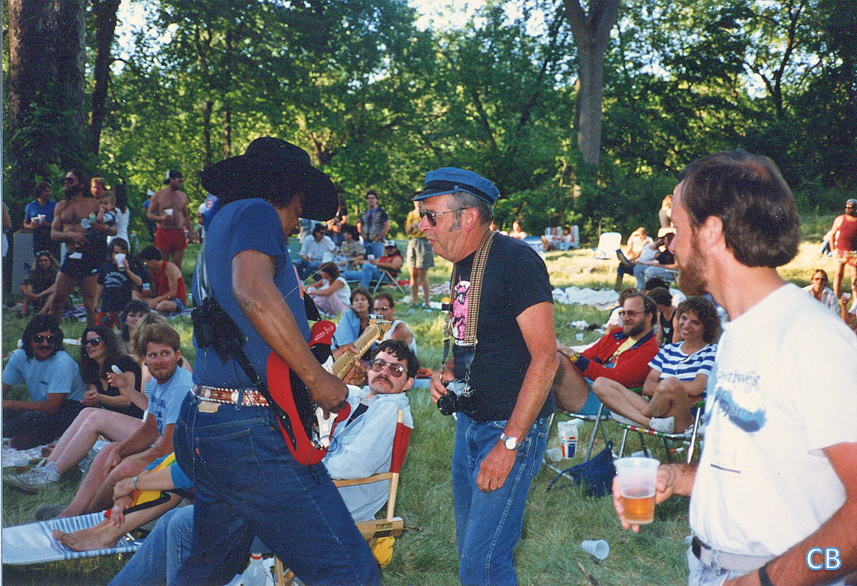
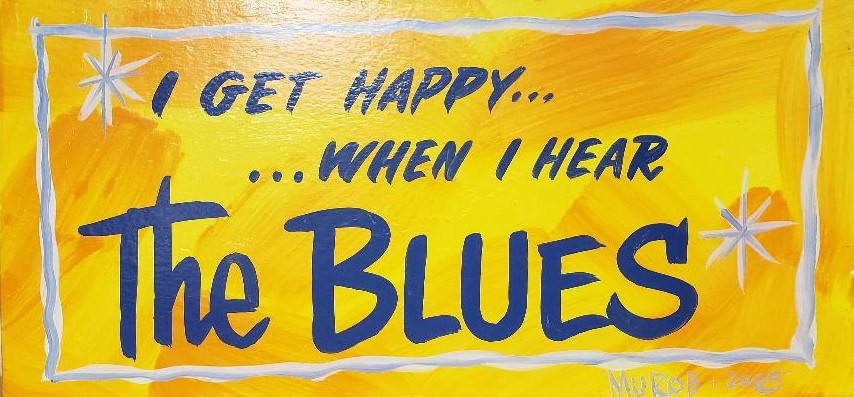
Curt's Blues - Blues. Only. Spoken. Here.
Keepin’ The Blues Alive And Thriving!
TELL ALL YOUR BLUES LOVING FRIENDS ABOUT CURT’S BLUES BLOG!
CURT IS TAKING NEXT WEEK OFF. THE NEXT NEW BLOG WILL BE ON JUNE 12TH. WATCH THE FACEBOOK PAGE FOR DAILY UPDATES AND SHORT TAKE CD REVIEWS.
Blues Artist Profile
A.C. Reed – Contemporary Chicago Saxophone King
I was greatly enjoying Alligator Records’ Living Chicago Blues, Vol. 3 collection this past weekend (ALCD 7703) – tunes originally released in 1980), and in particular, was reveling in A.C. Reed’s “She’s Fine.” The loping cadence of the song, with Reed declaring to all the world the fabulous attributes of his lady’s “structure,” perhaps represents the perfect crowd-pleasing club rave-up. Reed and his band, the Spark Plugs, consisting of Larry Burton and Phil Guy providing ideal funky blues guitar stylings, Allen Batts’ meandering keyboard runs, Aron Burton supplying staunch bass frameworks, and Casey Jones keeping everything together with his solid drumming, across their four selections of the disc remind me of some of my favorite times at Chicago’s Kingston Mines blues joint on N. Halsted St. when Reed would hold down a weekend slot. Listening to “She’s Fine” I could close my eyes and see Reed on the club’s stage, saxophone in hand, a mischievous twinkle in his eyes, and rousing the crowd with his always-gratifying blues tunes and on-stage demeanor.
Of course, hearing Reed on the Alligator Records compilation compelled me to seek out his other superb recordings, and over the weekend I reacquainted myself with his pleasing brand of blues. To that end, since I’ve not previously offered a brief overview of A.C. Reed’s life and blues trajectory, now seems the ideal time to do so.
The blues saxophone and vocal great we all know as A.C. Reed came into the world as Aaron Corthen in early May, 1926 in Wardell, Missouri, a very small town in Pemiscot County, a region in the extreme southeast portion of the state nearly abutting northwest Tennessee. As one would imagine in a rural town that consisted of a meager 0.28 miles, there wasn’t much in the way of entertainment, just the day-to-day hardships of rural life.
Like many of the blues artists profiled here, and for Reed (who took his performing name from bluesman Jimmy Reed), music provided an outlet for joy in his life. And Reed wasn’t alone in his early appreciation for music, and stated during his life that he was exposed to it from a young age along with other family members. He repeatedly acknowledged that he had a couple of brothers who played music, one having apparently fashioned a single-string bass out of a wash tub and pole, while another was drawn to the piano.
It’s interesting how blues artists arrive at their instruments-of-choice, and it is said that Reed had zero interest in pursuing playing anything other than the saxophone. Was their someone in his hometown area who played the instrument, was he perhaps attracted to it through listening to the radio (if the family did indeed have one), or did a musician who performed on the saxophone passing through town drive his desire to take up the instrument? I am not clear if anyone really knows.
What is certain is that Reed, at the age of 16-years-old, made his way northward to Chicago. For anyone in 1942 during the height of World War II to make such a move was bold, but for a teen it had to be especially daunting. However, Reed truly wanted to be a saxophone musician, and he saw Chicago as certainly offering way more chances to do so rather than the rustic area of Missouri from where he came.
Obviously, the first items on Reed’s list after arriving in the big city was to find shelter and employment, and he was able to obtain a position in a steel plant. Then, to satisfy his yearning to play the saxophone, he dedicated a portion of one of his early paychecks to acquire a tenor saxophone from a pawnshop operation.
Reed continued working in the steel mill, and knew he needed formal instruction on the saxophone, especially because one of his biggest musical interests was the big band format, and those assemblages not only needed top-tier musicians who were highly proficient on their instruments, but could also read charts, as well. He cited Jay McShann as an early musical inspiration. To achieve the musical training he felt he needed, Reed enrolled in the Chicago Conservatory Of Music. Like many aspiring musicians, Reed had his musical heroes, and he affinity for noted tenor saxophone giant Gene Ammons.
Without asking Reed directly why he found Ammons’ style of play so appealing, perhaps the answer is really quite apparent. As he continued his employment in the steel plant, Reed ventured out onto Chicago’s vibrant music scene to sit-in the blues bands to be found about town (though he was not of legal age). But remember, Reed found attraction to Ammons’ variety of play. Though Ammons was a jazz man, he tended to play, unlike others in his jazz circles, in a more soulfully rich, bluesy manner. It is only reasonable, then, to believe that Reed’s turning toward the blues was in some measure precipitated by Ammons’ more blues-designed jazz framework.
Sometime during Reed’s initial journey onto Chicago’s blues landscape, he was able to witness the legendary blues slide guitar titan, Elmore James, perform in the clubs, and thus was able to make contact with his saxophone bandmate, J.T. Brown (aka Nature Boy Brown, Bep Brown, and Saxman Brown). As Brown also performed on the tenor saxophone, making friends with Brown provided Reed someone to talk with and learn from regarding both his saxophone play and the blues panorama in Chicago. The biggest lesson it is said that Reed took from Brown was that it was not necessary to be that performer that tries to show-off and play as many notes as possible; no, it was very important to be sparse with how many notes one plays and to make each one count. Playing the saxophone behind a bandleader or as a bandleader, Brown strongly suggested, was about conveying the essence of the narrative upon which a particular song is based; the backing and solo should always complement the song.
World War II eventually ended in early September, 1945 and, when it did, Reed was still not old enough to be able to play in the clubs legally, though he continued to be let in the venues to sit-in. But once he turned 21 years of age, Willie Mabon, the blues and R&B piano player, singer, and harmonicist recruited Reed to perform with his bands in Chicago’s numerous music joints.
Reed had, up until this point, played exclusively on the Chicago circuit. However, Earl Hooker, the esteemed blues slide guitar great, saw the expertise Reed had on the saxophone and hired him into his band. After playing with Hooker for a bit, Reed signed on with Dennis “Long Man” Binder in 1956 as a member of Binder’s Rhythm & Blues All-Stars band, a gig that lasted for roughly four years, with a bulk of the performing taking place in the U.S. Southwest. Reed often intimated that while with Binder the group play a lot of up-tempo R&B music; think Little Richard type of fare. And interestingly, Reed often told of how the outfit played a considerable number of shows for Caucasian spectators.
But Reed tired of life on the road and missed Chicago, and in the very early 1960s he returned to the big city. There, he continued to gig in the clubs, though he had made a big enough name for himself to begin recording. In 1961, on Mel London’s Age Records label, Reed made his recording debut with Earl Hooker & His Band on one side of a 45rpm release, with Hooker having a release on the other side.
During the 1961-1963 period, however, Reed saw six sides released on Age Records under his own name. It is important to note that Hooker played on Reed’s records where he was the leader.
All the while Reed continued to play the blues joints he was also in demand as a session player, backing various bluesmen including singer Ricky Allen, vocalist Lillian Offitt, and the great post-war blues colossus Muddy Waters, while he also continued to back Hooker’s studio efforts.
Reed also saw the 1965 release of a 45rpm record on Chicago’s U.S.A. Records.
The year 1967 was to be big for Reed. Things were happening for the blues with young British fans devouring the music, and it was likewise the beginning of a domestic blues boom. Young Caucasians were increasingly turning toward the blues in America, and Reed saw the opportunity to make an alliance with Chicago blues guitar giant Buddy Guy and Chicago blues harmonica great Junior Wells as very advantageous. By joining forces with Guy and Wells, Reed experienced roughly a decade touring with them, playing shows across the United States. Through his association with Guy and Wells, Reed was able to be included on albums for them both.
However, even bigger things were to happen for Reed, as during the period when he was aligned with Guy and Wells he also toured with none other than rock-n-roll royalty, The Rolling Stones.
For the ten-year period when Reed was with Guy, Wells, and The Rolling Stones, there probably wasn’t a corner of America he didn’t perform in, even having the opportunities to ply his saxophone trade in far-away lands such as Japan and Africa.
It should be noted that during this period, Reed cut 45rpm records in 1969 and 1970 for the Chicago-based Nike Records and T-D-S Records labels, respectively.
But again, like other touring blues associations, the one with Guy and Wells concluded. Back in Chicago, Reed was leaning toward shying away from the endless touring road, only to play local shows.
However, there must be something about touring the countryside playing music that someone who is not a musician can’t understand because Reed’s absence for the road was very short-lived as he signed-on for a 1978 series of shows with the up-and-coming bluesman, Son Seals, that took place overseas.
But it can be successfully argued that Reed’s already significant awareness on the blues scene was about to grow exponentially when he became a five-year member of Albert Collins’ famed Icebreakers band. Through this association, two major things majorly and positively impacted Reed’s musical career. First, with Collins he got to relentlessly tour and be seen and heard by many thousands of fans, especially because he was put in the spotlight on each show to sing, giving the crowd a big taste of his world-weary, tongue-in-cheek, surly vocals and stellar saxophone work. Plus, he was able to be included on five of Collins’ Alligator Records release. Now, his profile had been extremely raised.
Also, in 1981, Reed had released a 45rpm record on the Chicago Ice Cube label.
Finally, 1982 was the year when Reed saw the release of his first full-length recording, one for the Ice Cube label entitled Take Thes Blues And Shove ‘Em!, an extremely enjoyable eight-song outing under the name A.C. Reed & His Spark Plugs, one that was the ideal for his, again, jaded and pained observations of life. One tune off of the release was nominated for a Blues Music Award.
1986 was another good year, as Reed and multi-instrumentalist Maurice John Vaughn released “I Got Money” on the Blue Phoenix label (also re-released on the Black & Blues label in 2002). But it was Reed’s 1987 Alligator Records release of I’m In the Wrong Business that again upped his blues profile. Here, the ten-song outing completely and abundantly presented the entire Reed blues package. The tunes were top-shelf, certain of his touring band were strongly behind him, his singing was never better, and the international stars who made guest appearances, guitarists and singers Bonnie Raitt and Stevie Ray Vaughan, brought their fans into the Reed world. This was, and remains, the definitive Reed collection. Alligator Records was indeed very good for Reed.
With his trademark dress shirts, striped pants, and small-billed hat, Reed and his band found a wanting blues public on the road, and they toured extensively all over the U.S. in venues both small and large, and upon festival stages, due to the success and exposure the Alligator Records release provided.
Another collection entitled Junk Food for Ice Cube Records saw the light of day in 1997 (re-released on Delmark Records in 1998), and there are other outings to be found, including one on Wolf Records.
Into 2003, Reed was still touring. But, in 2004, he died from cancer in early 2004, leaving behind a legacy of a very small-town Southern boy whose dream of playing the saxophone for a living came true, finding him multitudes of fans the world over.
Essential Blues Recording
Various Artists – The Blues Lineage Vividly Presented
Various Artists – Before The Blues – The Early American Black Music Scene – Vol. 1 – Yazoo 2015
Oftentimes I am distressed at how little many blues fans know of the origins and early purveyors of Black music. Listen, I am always joyful at anyone who chooses the blues as one of their favorite musical forms, but I guess from my long study of the blues from an academic perspective I frequently wish folks took just a little bit of time to research from where and how the music developed into today’s popular contemporary framework.
Here is one of the ideal vessels from which to gain a fuller understanding of the blues and its roots, 23 1920s and 1930s selections that will open eyes and ears in new ways to the music.
This astounding collection, one of three in a series, presents the profound diversity of Black musical forms including folk tunes, fiddle forays, and gospel songs that blended and stewed together to eventually produce the blues.
These are not all blues songs in configuration; no, many blues fans would be surprised to hear banjo workouts, searing fiddle incursions, jug band breakdowns, and gospel choir caroling, many from names certainly not known to most blues fans. Yet, certain of blues giants such as Mississippi John Hurt and Henry Thomas, for examples, are to be found here.
The cuts organized here signify the melting pot that was early 20th century Black musical experience and, when one considers how it all eventually commingled into the blues, one can’t help but be thoroughly astonished.
Understand that some of this music is rough sounding due to its age, but do not let that be a deterrence!
This is essential to any blues collection!
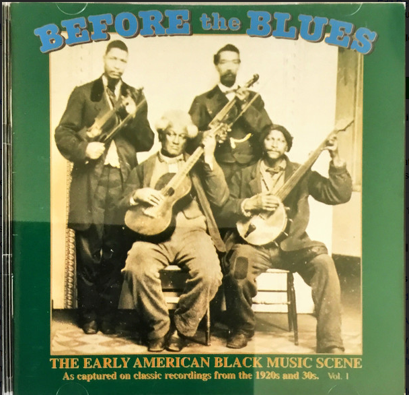
Recommended Blues Recording
All Things Swamp – The Sultry Musical Air Of New Orleans Shines
All Things Swamp – Dressed – Little Village Foundation LVF 1070
Little Village is a non-profit record label whose mission it is to brightly place the spotlight on highly skilled artists who quite possibly could not otherwise rise into the consciousness of music fans. The label, based upon its offerings to-date and this reviewer’s high appreciation of them, seems to also understand that in building a curiosity and appreciation for varied musical forms benefits the larger whole of society.
Upon listening to the superb eight selections on this fantastic collection, will one feel immersed into the sticky sweetness of a hot New Orleans night? You bet! Among the nine diverse musicians who comprise the assemblage of All Things Swamp, one thing easily certainly rises like cream to the top; all involved amassed to provide their specific considerable skill sets to ensure this musical ride best represents the rhythmic, eclectic resonances of New Orleans.
Rarely does a collection pay tribute to the Crescent City’s musical heritage as reverently as this astounding outing, and do so without any pretention; this is a band of gentleman who obviously hold the New Orleans melodious stew in the loftiest of regards.
On the basis of how grand this musical venture truly is, it is highly recommended for all who enjoy the funky, earthy, rollicking, mysterious, and transcendental beat of New Orleans music at its finest! This is musical spiritualism!
Yet again, bravo Little Village Foundation!
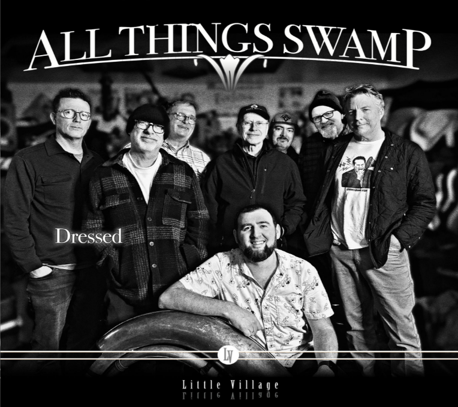
Short Take CD Reviews & Other Information
Short Take CD Reviews
Reverend Freakchild – A Bluesman Of Sorts – Treated And Released Records TNR-019 – The Good Reverend Indeed Preaches The Blues
Released on May 23rd, this two CD set, 19 cuts in all, of the Colorado-based minister of music, a consecrated songster, a furtherer of the blues with his other musical leanings interspersed, one who is known to proudly and robustly proclaim, “Music is my religion” and “Through song I seek transcendence,” sets the blues bar very high! And very much like his 2013 Chaos & Country Blues collection, musical excellence is found here. The good Reverend indeed again impresses with what appears to be his purpose to enlighten the masses to the ecstasy of the blues and additional musical frameworks. His distillation is simply worthy of any blues fan’s time and dollars. Pick this one up! Well done, Reverend!
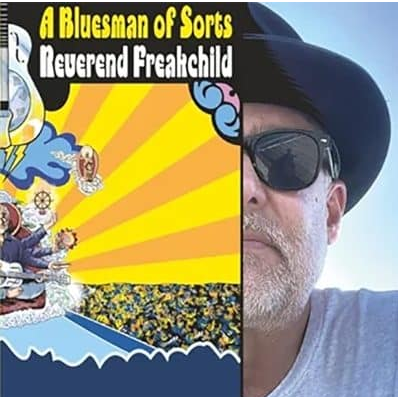
Kim Field And The Perfect Gentlemen – Don’t Need But One – Blues Dream Records (no label #) – Exceptional Blues And Roots Music From An All-Star Cast
Kim Field calls Portland, Oregon his home, and is a harmonica specialist and vocalist whose resume is deep with experience via his broad engagements on shows with a veritable “who’s-who” of the blues genre, appearing on both stateside and overseas gigs. Field may also be known to many as an author who counts among his work The Blues Dream of Billy Boy Arnold and Harmonicas, and Harps, and Heavy Breathers: The History of the People’s Instrument. This is the introductory release of the roots music assemblage Kim Field And The Perfect Gentlemen, one that saw its release on April 14th, an 11-song outing (with ten originals). Oh boy, is this blues and roots music of the highest distinction! Field’s harmonica forays are tasty and substantial, yet never frenzied, and his singing is full and assured. The Perfect Gentlemen are indeed an all-star collaborative assemblage, and each, I mean each, participant is extremely gifted in their expertise. Having ten originals of this quality is so refreshing in this day and age, and the engineering and production is top-tier. Hopefully this release opens the door to a great awareness of Field and his blues co-conspirators. Great work!
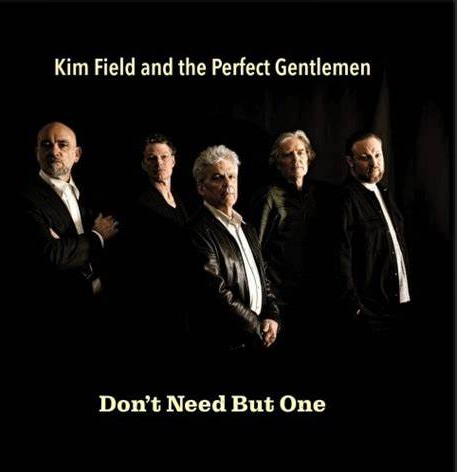
Upcoming Short Take CD Reviews
Labels, artists, and publicists, as we move deeper into 2025, it’s a great idea to get your blues CDs mailed to me for reviews as early as possible as you bring new collections to the market! Remember, please, only blues CDs! I am looking forward to a great 2025 filled with exciting new releases!
Reviews for new collections by David M’ore, Brad “Guitar” Wilson, Rusty Ends & Hillbilly HooDoo, Alan Arena, Lisa Mann’s Northwestern All-Stars, and Emma Wilson will be written over the next few weeks.
We’re working through them! I have been informed by artists and publicists that more are on the way!
Blues Song Of The Week
“Sugar Mama” – Sonny Boy Williamson I – Bluebird label #B-7059 – Released in 1937
New Jasmine Records Releases
Jasmine Records released a host of new collections on May 9th. Jasmine Records’ work is to be highly applauded. The following will no doubt being of particular interest to Curt’s Blues Blog readers:
- JASCD1246 – Chuck Berry – The Jasmine EP Collection
- JASCD1238 – Buddy Knox – Liberty Cuts
- JASCD – Various Artists – The White Roots Of Elvis
- JASMCD3308 – Ella Johnson – The Mercury Years, 1953-1957
- JASMCD3312 – Mississippi John Hurt – Ain’t Nobody’s Doggone Business
Document Records’ Vital Work
Document Records’ mission since 1985 has been to unearth, repair, and re-release the complete recorded works of the majority of Black artists and their recordings from the 1890s to the mid-20th century. The label’s blues selections are presented in chronological order and include studious notes and comprehensive discographic info.
The Document Records online store is simply amazing, and a place where over a thousand collections of astounding past recordings are offered for purchase, either as CDs or as downloads. Document Records offers exciting bundles of recordings on certain artists that bring great value to collecting blues music.
Curt’s Blues Blog is a huge supporter of the important work that Document Records performs, and a great many of the label’s CDs reside in my personal collection.
Below is a link to the online Document Records store. No matter where you are in building your blues collection, you should definitely visit the Document Records online store. You will not be disappointed!
Document Records – Vintage Blues and Jazz
New Delmark Records And Alligator Records News And Offerings
Delmark News And Releases
- Pierre Lacocque has signed with the label for a new 2025 Mississippi Heat collection, the sixth with Delmark Records, one most likely be released in mid-August with a title of Don’t Look Back
- The new Tad Robinson collection entitled Soul In Blue saw a release date of May 2nd; it is superb
- A new solo piano CD entitled Johnny Iguana: At Delmark is out, and it is terrific (see this blog’s review of it in the “Prior Recording Reviews” section under “Recommended Blues Recordings”)
- Dave Specter will have a new collection released on June 6th entitled Live At SPACE (see this blog’s review of it in the “Prior Recording Reviews” section under “Essential Blues Recordings”)
- Check out all the new singles by various artists on the label’s web page
Alligator News And Releases
- The label is to release Koko Taylor’s Crown Jewels LP on July 18th, a new greatest hits collection that will also be available digitally
- The label’s artists won a total of nine Blues Music Awards
- K. Harrell has signed with the label, with his first collection, Talkin’ Heavy, to be released on June 20th
- Numerous label artists will perform at the Chicago Blues Festival, including D.K. Harrell, Billy Branch & The Sons Of Blues, and Christone “Kingfish” Ingram
- Carolyn Wonderland’s new release entitled Truth Is was released on May 16th
It’s too bad that Alligator Records won’t provide this blues blogger with hard copy CDs of their upcoming releases for reviews. As I’ve explained to the label, I do not perform reviews via electronic sound files. I guess that 12,700+ blog readers aren’t enough for the label to send hard copy CDs! Please, urge them to do so!
Please visit Delmark’s and Alligator’s web sites for information on all the goings on at the labels.
DELMARK RECORDS – Blues & Jazz since 1953
Living Blues Magazine – Latest Edition
The latest edition of Living Blues Magazine is out with features on Wallace Coleman, Stoney B, and Jeff Floyd, along with their Let It Roll series that focuses on T-Bone Walker’s 1947 outing for Black & White Records, a writing by David Evans entitled Expounding Upon The Myths Of Robert Johnson, and of course, the publication’s broad recording review section and additional extensive features. This writer has been a Living Blues subscriber for 36+ years, and though I may not always agree with their record reviews or their journalistic direction, I can’t stress enough how vital this magazine is to the blues. Please consider a subscription if you don’t already have one and support the magazine’s fine work, and the blues in general.
A Reminder To Support “Live” Blues And Purchase A Blues Recording
Touring blues musicians endure an arduous life of traveling city-to-city, sometimes with the distance between shows being many miles. This equates to large outlays for gasoline, food, and lodging (if not often sleeping in vehicle while traveling), When these talented blues artists roll through your town, please consider parting with some of your hard-earned dollars to attend their shows.
Also, with so many online platforms offering blues recordings for sale (check out the Curt’s Blues Blog “Resources” page for many of them), please think about purchasing a new blues CD or MP3 recording for your collection. And often, artists sell their recordings at their shows.
CD Reviews
Once again, a reminder: If you want a CD reviewed, please contact me via the email address found on the Curt’s Blues Blog “Contact” page, and I will promptly answer with the mailing address to get the CD to me. I do not perform reviews via electronic sound files. Please don’t put your promotion company’s sticker over the record company information on the back of the CD jacket. Please be mindful that this is a blues blog, and that providing rock, pop, hip hop, or Americana CDs for review will not find them being considered. And please, don’t mail me CDs with postage due!
It is a goal of mine to have as many CD reviews as possible pass through the blog.
Thank you.
